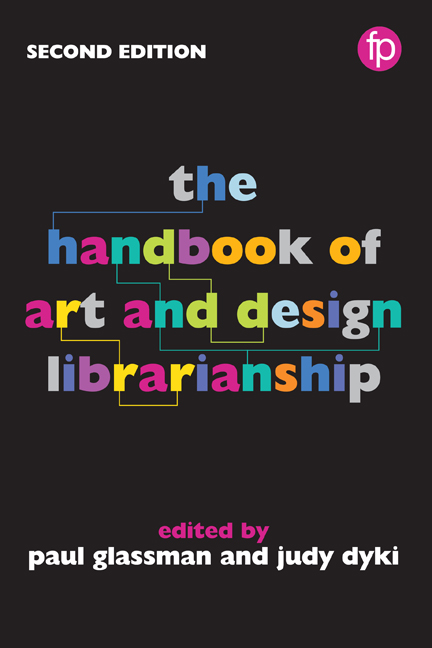Book contents
- Frontmatter
- Contents
- List of figures and tables
- Notes on contributors
- Foreword
- Preface
- Part I Roles and responsibilities
- Part II Materials and collection management
- 6 Visual resources: from analogue to digital and beyond
- 7 Developing digital collections
- 8 Inspirational encounters: the management and use of archives and special collections in the art and design library
- 9 What is special about special collections?
- 10 Artists’ books in the art and design library
- 11 Art documentation: exhibition catalogues and beyond
- 12 Tactile libraries: material collections in art, architecture and design
- 13 Seeing the bigger picture: archival description of visual information
- Part III Teaching and learning
- Part IV Knowledge creation
- Part V The physical environment
- Part VI Promotion and sustainability
- Appendix Library profiles
- Index
8 - Inspirational encounters: the management and use of archives and special collections in the art and design library
from Part II - Materials and collection management
Published online by Cambridge University Press: 08 June 2018
- Frontmatter
- Contents
- List of figures and tables
- Notes on contributors
- Foreword
- Preface
- Part I Roles and responsibilities
- Part II Materials and collection management
- 6 Visual resources: from analogue to digital and beyond
- 7 Developing digital collections
- 8 Inspirational encounters: the management and use of archives and special collections in the art and design library
- 9 What is special about special collections?
- 10 Artists’ books in the art and design library
- 11 Art documentation: exhibition catalogues and beyond
- 12 Tactile libraries: material collections in art, architecture and design
- 13 Seeing the bigger picture: archival description of visual information
- Part III Teaching and learning
- Part IV Knowledge creation
- Part V The physical environment
- Part VI Promotion and sustainability
- Appendix Library profiles
- Index
Summary
Introduction
Archives and special collections are an essential element in the documentation of the history and practice of art and design. They play a major role in the collections of academic libraries, supporting teaching, learning and research. These collections have never been in more demand – in an age of superabundant information we are experiencing ‘a material turn’, a return to the physical and the idea of the authentic and unique. Institutions value and promote them as strategic assets, and their academic use is increasingly popular and wide ranging. This chapter presents a general overview of current best practices in the development and management of archives and special collections within the specific context of art and design academic institutions, primarily in the UK and USA.
There is a general consensus in the professional literature about the definition of archives: ‘Archives are collections of information (…) in many forms such as: letters, reports, minutes, registers, maps, photographs and films, digital files, sound recordings (…). Some archives are created by official bodies such as governments, businesses or professional organisations. Others are private collections’ (National Archives). Definitions for special collection(s) are more varied. An elastic term, archives often comprises rare books and manuscripts and also a range of other formats (ephemera, rare periodicals, artists’ publications, zines and so on). The Association of College & Research Libraries uses the following definition: ‘The entire range of textual, graphic and artefact primary source materials in analogue and digital formats, including printed books, manuscripts, photographs, maps, artworks, audio-visual materials and realia’ (ACRL Code of Ethics for Special Collections Librarians, 2003).
Policies, resources and acquisitions
Institutional context and strategies
Archives and special collections play a particular role in distinguishing and characterizing institutions, and are rich resources for teaching, learning and research internally and for engagement with communities beyond the institution. This differentiating role and relationship to institutional mission and identity was described in a recent report on unique and distinctive collections by Research Libraries UK: ‘a collection that, regardless of format or location within an institution, derives significance from its interest to research, teaching, or society through its association with a person, place or topic, such as to distinguish the consistent items from similar items which may exist elsewhere’ (Research Libraries UK, 2014).
- Type
- Chapter
- Information
- The Handbook of Art and Design Librarianship , pp. 75 - 88Publisher: FacetPrint publication year: 2017



